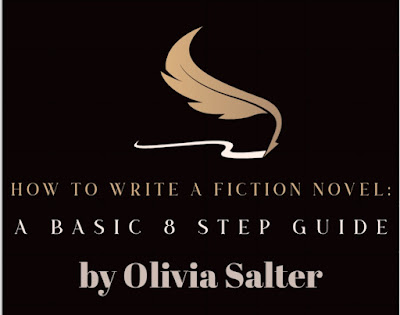How to Write a Fiction Novel: A Basic 8 Step Guide
by Olivia Salter
Writing
a fiction novel is an exhilarating and rewarding endeavor that allows
you to unleash your creativity onto the pages. However, for many
aspiring authors, the process of starting and completing a novel can
seem overwhelming. With a well-organized approach and a clear plan in
mind, you can effectively navigate the intricate journey of writing a
fiction novel. In this 8 step guide, we will walk you through the
key stages and offer valuable insights to help you bring your story to
life.
Step 1: Develop an Idea:
Every novel begins with an idea, and the key to a successful fiction novel lies in its concept. Allow yourself time to brainstorm, jotting down multiple ideas until you find one that deeply resonates with you. Consider elements such as genre theme and characters and envision how they could intertwine to create an engaging story.
Step 2: Outline Your Plot:
Once you have your idea, outline the main plot points and create a structure for your novel. This step will serve as your roadmap, allowing you to maintain a clear direction as you write. Identify the major plot points, conflicts, and key events that will drive your story forward. This outline can be as simple or detailed as you prefer, providing a solid foundation for your writing journey.
Step 3: Develop Compelling Characters:
Characters are the heart and soul of any fiction novel. Spend time getting to know your main characters intimately. Understand their motivations, fears, flaws, and desires. Create realistic, multi-dimensional characters that readers can connect with on an emotional level. Remember that your characters should drive the plot forward, so ensure their actions and choices are consistent with their personalities.
Step 4: Create a Setting:
The setting of your novel sets the stage for the story and plays a vital role in immersing readers in your world. Whether it's an imaginary fantasy realm or a realistic urban city, describe the details that will bring your setting to life. Use vivid descriptions and engage all five senses to make the readers feel as if they are right there with your characters.
Step 5: Write the First Draft.
With the foundation established, it's time to embark on the exciting task of writing your first draft. Set a regular writing schedule and commit to writing consistently. Allow your creativity to flow freely, focusing on getting the story down on paper without being overly critical of every word or sentence. Remember, the first draft is about getting the story out, and you can refine it later.
Step 6: Revise and Edit
After completing the first draft, take a step back and let it breathe. Give yourself some distance before diving into the revision process. Focus on refining the plot, character arcs, dialogue, and pacing. Pay attention to grammar, spelling, and sentence structure. Consider seeking feedback from trusted beta readers or joining a writing group to gain fresh perspectives on your work.
Step 7: Polish and proofread:
Once you are satisfied with the overall structure and content of your novel, it's time to polish and proofread your manuscript vigorously. Read your novel multiple times, paying attention to every detail, and ensuring that it is error-free. Make sure the writing flows smoothly and the story is engaging. Consider hiring a professional editor to provide valuable insights and assistance in perfecting your manuscript.
Step 8: Seek Publication or Self-Publish:
The final step in the process is to decide on the publishing route for your novel. Research traditional publishing houses and literary agents and submit your manuscript following their guidelines. Alternatively, explore the option of self-publishing, which offers greater control and flexibility. In today's digital age, self-publishing has become a viable and successful avenue for many authors.
In conclusion, writing a fiction novel requires time, dedication, and passion. By following this step-by-step guide, you can navigate the process with confidence, creating a captivating and well-crafted story. Remember, every writer's journey is unique, so adapt these steps to suit your own style and preferences. Embrace the joy of storytelling and stay persistent, always believing in the power of your words. Happy writing!
Also see:
Article Sponsor
Have you heard about LifeWave X39?
X39 is a true breakthrough in regenerative science. Using light, X39’s patented health technology elevates the copper peptide GHK-Cu-cu, which is known to assist health and wellness.
Writers learn about a lucrative business opportunity.


No comments:
Post a Comment